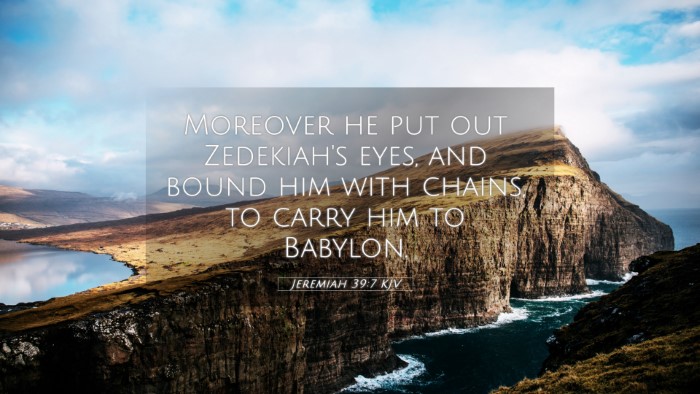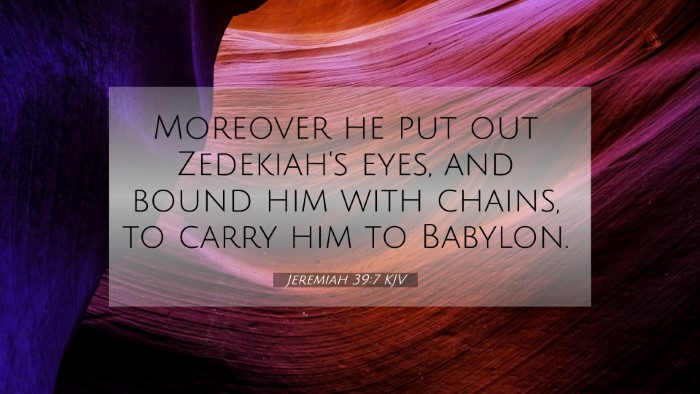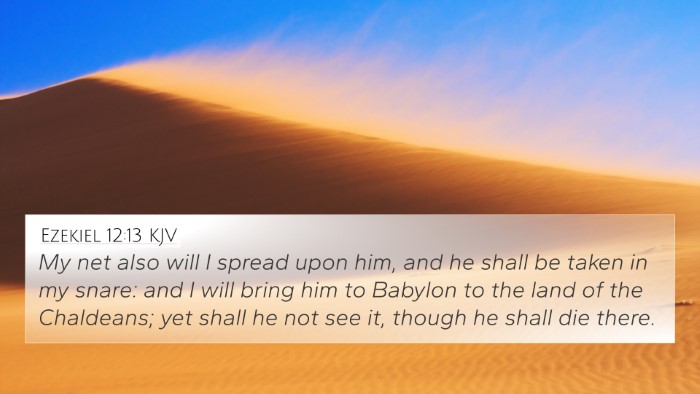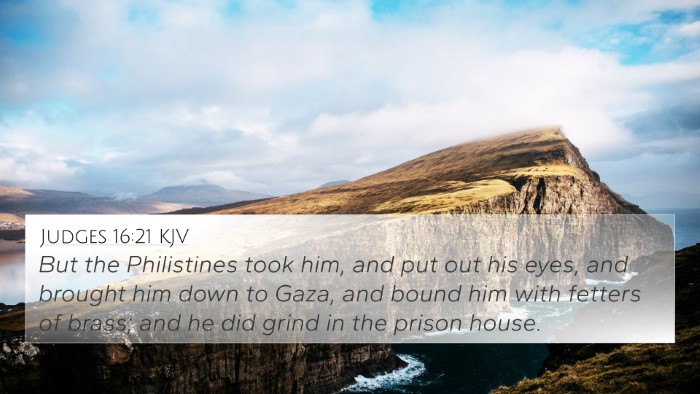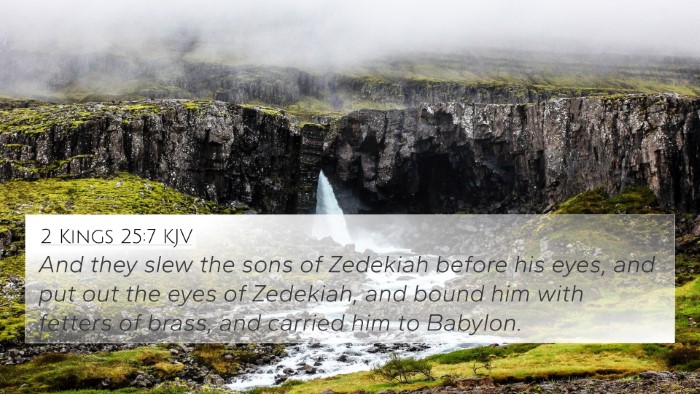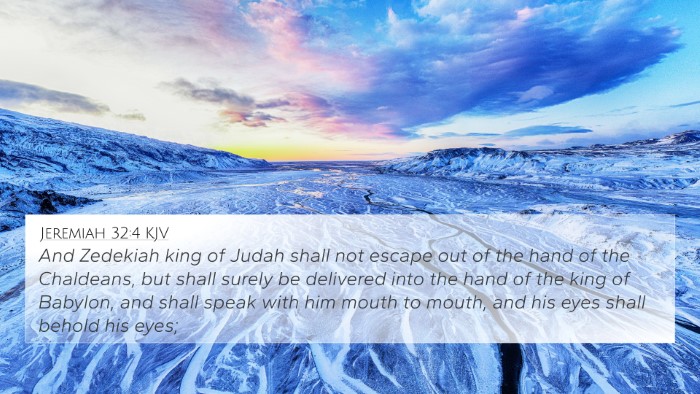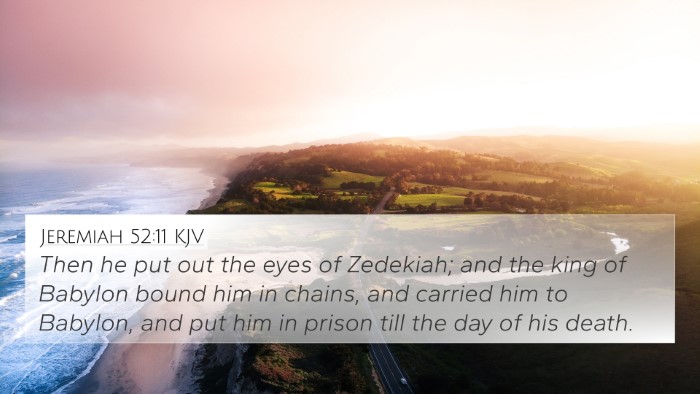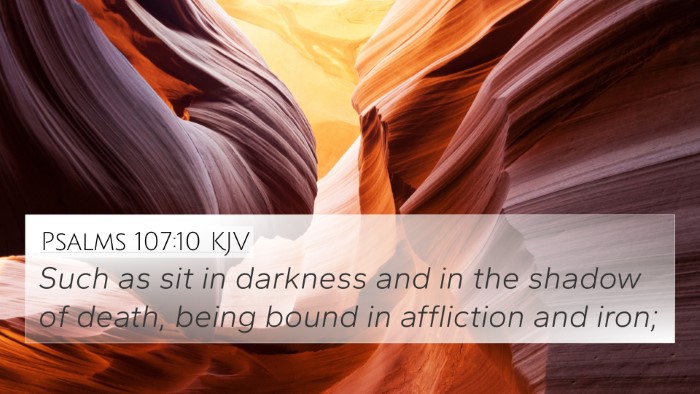Understanding Jeremiah 39:7
Jeremiah 39:7 states: "Moreover he put out Zedekiah's eyes, and bound him with chains, to carry him to Babylon." This verse is a profound moment in the book of Jeremiah, symbolizing the complete downfall of Jerusalem and the fate of King Zedekiah. Through this event, significant themes of judgment, loss, and God’s sovereignty are explored.
Summary of the Verse Meaning
The acts described in Jeremiah 39:7 serve as a stark reminder of the consequences that follow disobedience to God’s commands. Zedekiah’s fate speaks volumes about the impact of sin and the gravity of turning away from divine injunctions.
Analysis from Public Domain Commentaries
Matthew Henry's Commentary
Matthew Henry explains that the blinding of Zedekiah was both literal and metaphorical. It symbolizes Zedekiah's spiritual blindness that led to his downfall. His inability to heed the warnings of the prophet Jeremiah culminated in dire consequences. The narrative illustrates God's justice as Zedekiah is left helpless, a dramatic reversal of power that emphasizes the sovereignty of God in the affairs of nations.
Albert Barnes' Notes
Albert Barnes provides insight into the significance of Zedekiah’s chains and sightlessness. He highlights that losing one's sight often represents a loss of hope and vision for the future. The binding of Zedekiah reflects the unbreakable grip of Babylonian power at that moment, showcasing the stark reality that comes from ignoring providential signs and messages from the Lord. Barnes emphasizes that this act fulfills prophecies about the destruction of Jerusalem and the fate of its king.
Adam Clarke's Commentary
Adam Clarke elaborates on the impact of this event on the Jewish people. The terrors of captivity and the destruction of their homeland were highlighted by the personal tragedy of their king. Clarke notes that this act was a grim end to Zedekiah's kingship and a crucial point in Jewish history, marking the transition into exile. Clarke underscores the idea of divine retribution for national sins, reiterating that God’s judgments are often manifested through tangible events in history.
Bible Verse Cross-References
- Jeremiah 32:4 - Prophecy of Zedekiah's downfall.
- 2 Kings 25:7 - Parallel account of Zedekiah's fate.
- Ezekiel 12:13 - Reference to Zedekiah's exile.
- Isaiah 39:6-7 - Prophecy concerning the deportation of the people.
- Lamentations 2:9 - The despair of Jerusalem's fall.
- Daniel 1:1-2 - Historical context of Jerusalem's capture.
- Matthew 24:2 - Jesus’ prophecy on the destruction of the temple.
Thematic Connections
This verse connects to broader biblical themes, including:
- The importance of obedience to God’s will.
- The consequences of pride and rebellion against divine authority.
- Judgment as a recurring theme in both Old and New Testaments.
- The restoration theme, as God later promises to restore His people.
Inter-Biblical Dialogue
Jeremiah 39:7 prompts a dialogue between various biblical texts. The Old Testament prophets frequently warn about sin leading to destruction, which resonates with New Testament teachings on the judgment and grace of God. For instance, the warnings in Ezekiel about the consequences of unfaithfulness amplify the message seen in Jeremiah. Meanwhile, parallels can be drawn with Jesus' warnings about the judgment of Jerusalem.
Conclusion
In summary, Jeremiah 39:7 serves as a sobering reflection on the creativity of God’s justice and His governance over human kingdoms. Understanding this verse not only highlights the historical events concerning Zedekiah but also invites believers to introspect on their obedience to God, emphasizing that turning away from His statutes can lead to dire consequences. Connecting this verse through cross-references enhances our comprehension of scriptural themes, fostering a deeper appreciation for the interconnectedness of Biblical narratives.

